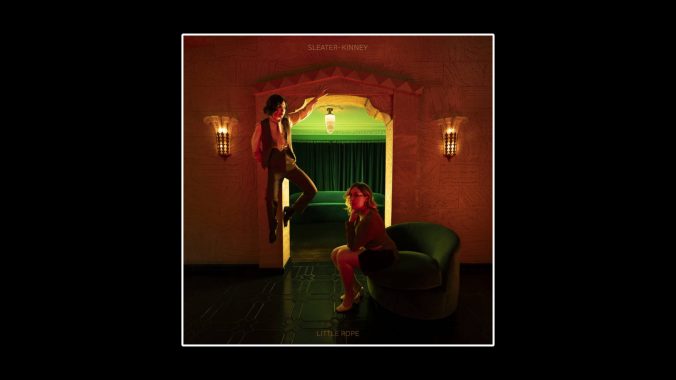On Little Rope, Sleater-Kinney Remind Us Why We Love Them
The duo's 11th studio album features some of their most promising music since No Cities to Love, but its highs play tug of war with its lows.

When Path of Wellness came out in 2021, it seemed like Sleater-Kinney had jumped the shark. After rebranding as pop superstars sans guitars for the monochrome synth-pop of the St Vincent-produced The Center Won’t Hold, Carrie Brownstein and Corin Tucker unceremoniously parted ways with long-serving drum goddess Janet Weiss, whose kinetic playing was, literally, a third of their sound, make-or-break for the whole operation. Sleater-Kinney hurriedly pivoted back to guitars—to the sluggish capital-R rock of Path of Wellness, which wasn’t boldly different or a return to form. Concurrently, every pre-The Woods song was culled from live setlists. The one exception was, tellingly, “One Beat,” which posits: “If I’m to run the future, you’ve got to let the old world go.”
Towards the end of last year, two things happened: The band released a song better than most things from those previous two records—“Hell,” the squawking, blown-out lead single from the new album Little Rope—and, happily, as of one of their most recent shows, filled their setlist with a bunch of back catalog gems, ostensibly finding a way to coexist with their history rather than stranding it in quarantine. Oh, how I’m relieved “Oh!” is back in rotation. And I’m relieved Sleater-Kinney is back! You can almost feel the collective wave of relief sweeping their fandom as the sizzling chorus of “Hell,” the album’s opener, surges out of the darkness, and even more so when “Needlessly Wild”’s malfunctioning guitar sputters and unswerving motorik beat kick in.
Indeed, this 11th studio album is not only much better than Path of Wellness, it finds the band moving forward in a balanced, logical way—trading the jarring handbrake turns of that 2019-2021 era for the subtle gentrification that guided their sound from day one through their reunion. It splits the difference between One Beat and No Cities to Love with some of The Center Won’t Hold’s sleek, silver caramel sealing the gaps.
This feeling of new hope is succinctly telegraphed by the Brownstein-led “Don’t Feel Right,” whose bouncy major-key verse collars you and plants a kiss. “I get up, make a list / What I’ll do, once I’m fixed / Read more poems, ditch half my meds / Dress my age, call back my friends,” Brownstein huffs in her signature first-thing-in-the-morn moan-sing, the regular rhyme scheme and solid rhythm tickling you under the chin. It’s especially impactful because Little Rope employs Brownstein’s voice more sparingly than previous records, a deliberate choice enabling her to channel more energy into her playing.
-

-

-

-

-

-

-

-

-

-

-

-

-

-

-

-

-

-

-

-

-

-

-

-

-

-

-

-

-

-

-

-

-

-

-

-

-

-

-

-








































